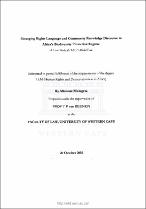| dc.contributor.advisor | van Reneen, TP | |
| dc.contributor.author | Mulugeta, Allehone | |
| dc.date.accessioned | 2023-06-14T11:49:14Z | |
| dc.date.available | 2023-06-14T11:49:14Z | |
| dc.date.issued | 2002 | |
| dc.identifier.uri | http://hdl.handle.net/11394/10246 | |
| dc.description | Magister Legum - LLM | en_US |
| dc.description.abstract | Africa possesses huge amounts of genetic resources and traditional knowledge that sustain diverse small economies and local livelihood. The integrity of this natural wealth and cultural Pattern, however, is being seriously undermined by heightened encroachment. Absence of over-sight structures and IPRs' failure to afford adequate recognition and protection to genetic resources and traditional knowledge condoned such encroachment. IPIG often encourage intense commercialisation of life forms and the latter's protection through patent which not only disadvantage local communities but also create enormous strain on existing ecological balance. Examples abound that show how Western research institutions and pharmaceuticals collected, developed and commercialised African biodiversity without due recognition to local communities' contributions. This has become even more evident as increased investment on herbal health care, Iife science
and related pharmaceutical developments significantly increased the value and market demand of genetic resources. | en_US |
| dc.language.iso | en | en_US |
| dc.publisher | University of the Western Cape | en_US |
| dc.subject | African biodiversity | en_US |
| dc.subject | Environmental and health consequence of GMO's | en_US |
| dc.subject | Model Iaw | en_US |
| dc.title | Emerging, rights language and community knowledge discourse in Africa's biodiversity protection regime : a case study of OAU's Model Law | en_US |
| dc.rights.holder | University of the Western Cape | en_US |

